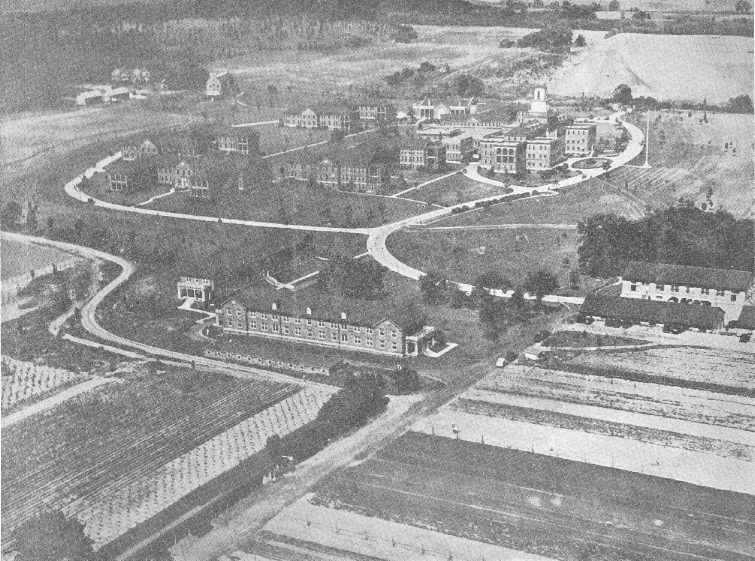CPS Unit Number 080-01
Camp: 80
Unit ID: 1
Title: Lyons Veterans Hospital
Operating agency: BSC
Opened: 4 1943
Closed: 8 1946
Workers
Total number of workers who worked in this camp: 249
-
 CPS Camp No. 80, Lyons New Jersey.Aerial view of Lyons Veterans Hospital; 1940. Donated by Philip A. Orpurt.Digital Image © 2011 Brethren Historical Library and Archives. All Rights Reserved.1940
CPS Camp No. 80, Lyons New Jersey.Aerial view of Lyons Veterans Hospital; 1940. Donated by Philip A. Orpurt.Digital Image © 2011 Brethren Historical Library and Archives. All Rights Reserved.1940
CPS Unit No. 80, a Mental Hospital unit located at Veterans Administration Hospital in Lyons, New Jersey operated by the Brethren Service Committee, opened in April 1943 and closed in August 1946. The majority of the men served as ward attendants.
Directors: Alfred Rath, Allan Neubauer
Of the men serving at Lyons, the majority were married. At one point, of the twenty-four men in the unit, fifteen were married. In the early months, five of the wives worked at the hospital for pay, since they were not subject to Selective Service regulations.
Men at the Brethren Service Committee camps and units tended to report a mix of Brethren and non-Brethren denominational affiliations when entering CPS.
On average, men at Brethren camps had completed 12.22 years of education, with nearly forty percent having completed some college, had graduated or had taken post graduate work. (Sibley and Jacob p. 171)
The majority of the men served as ward attendants, although some also served in clerical, agricultural, maintenance and construction, motor vehicle operation, technical and professional as well as food preparation roles.
Of the 91,164 person hours accomplished during the life of the unit at Veterans Administration Hospital, ward attendants provided 80,373 hours while those serving in food preparation contributed 7,139 hours and those in clerical roles gave 2,016 hours of service. (Selective Service form DSS 52 as published in Eisan p. 212)
For a brief time four married couples lived in a farmhouse on the grounds of the hospital. However, a flurry of criticism in local newspapers caused hospital administrators to order the men to move back into the dormitories and restricted them to “brief visits” with their wives at the farmhouse in public quarters. Frances Clayton recalled “Well, we abided [by the rules], believe me, and as a result I don’t think there were any babies made at that time” (Goossen p. 58).
The Veterans of Foreign Wars (VFW) took exception to any privileges afforded to COs. In fact, the New Jersey branch of VFW passed a resolution condemning “colonization” of the CPS unit at Veterans Administration Hospital in Lyons.
Selective Service, in response to complaints about assignees working off hours, issued a directive requiring superintendents to give permission to assignees for off-site work in their off-duty hours. At Lyons, the acting hospital director Homer Rogers took the directive seriously and specified that nineteen COs were approved to work from six to twenty hours per week in fields he specified . . .as long as employment would not interfere with their hospital duties.
After the unit had been established for a time, camp administrators representing church committees recruited for additional men at the Veterans Hospital. One such brochure, 25 Men Needed at Lyons, candidly described the unit living and working conditions.
The hospital administration has now decided to house all men in the attendants’ building, four men to a room, using double deckers. Selective Service has approved this. There has been considerable objection on the part of the men, but the majority are willing to accept the crowded conditions. The building is modern, fireproof and newly renovated, and despite the inconvenience should result in great unity of the group. (Taylor p. 177)
One of the men, reflecting on his experience at Lyons in a 1988 survey, recalled that one of the unit COs
. . .was so revolted by the atrocities that constantly occurred on the wards that without telling anyone exactly what he was up to [he] began compiling detailed descriptions of brutality instigated by regular attendants. In addition to those incidents . . . he collected additional accounts of abuse from after hours’ conversations and mealtime chit-chats. Without their knowing it, everybody in the institution was providing grist for the mill . . . into a several-hundred page document. One day, he suddenly packed his duffle bag and left Lyons . . . informed the authorities that he was refusing to participate further in his assignment, thereby earning for himself a prison sentence, but not before presenting the authorities and the press with copies of his documented abuses at Lyons. (in Sareyan p. 247)
A federal investigator did appear at the hospital to take sworn depositions from everyone named in the document, heightening tensions between unit men and regular attendants.
In spite of the tensions created, hospital leaders deeply appreciated the COs’ work, noted in a hospital manager’s letter to Colonel Lewis F. Kosch of Selective Service. “The unit has performed a most valuable function to this Hospital and undoubtedly, has saved many veterans’ lives . . . .“ (Eisan p 234)
In the summer of 1945 the men conducted a relief drive raising $178 to buy heifers for the Church of the Brethren Heifers-for-Relief program. In December of the same year, the men raised $276 to purchase dried milk for European relief.
Beginning in January 1944, the men produced Bridge, a paper which continued for part of the year. From March 1945 through July 1946, the men published a unit newspaper called This Week.
For information on Brethren mental health and training school units see Leslie Eisan, Pathways of Peace: A History of the Civilian Public Service Program Administered by the Brethren Service Committee. Elgin, IL: Brethren Publishing House, 1948, Chapter 6, pp. 205-238.
For more information on women COs see Rachel Waltner Goossen, Women Against the Good War: Conscientious Objection and Gender on the American Home Front, 1941-47. Chapel Hill, NC: The University of North Carolina Press, 1997.
See also Alex Sareyan, The Turning Point: How Persons of Conscience Brought About Major Change in the Care of America’s Mentally Ill. Scottdale, PA: Herald Press, 1994.
For an in depth history of conscientious objection in the United States, see Mulford Q. Sibley and Philip E. Jacob, Conscription of Conscience: The American State and the Conscientious Objector, 1940-1947. Ithaca, NY: Cornell University Press, 1952.
Swarthmore College Peace Collection CPS, Camp periodicals database.
For more in depth treatment of the mental health and training school units, see Steven J. Taylor, Acts of Conscience: World War II, Mental Institutions, and Religious Objectors. Syracuse, NY: Syracuse University Press, 2009.
